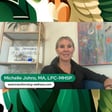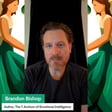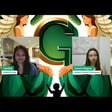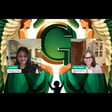Become a Creator today!Start creating today - Share your story with the world!
Start for free
00:00:00
00:00:01

Episode Eight: Childhood Trauma Series - First Comes Love
Childhood trauma can affect all aspects of our well-being, particularly our relationships.
Negative behaviors in our relationships often stem from unmet needs we had as children. Couples therapy can help partners examine where their conflicts come from and, in turn, break toxic cycles as parents.
Dr. Hannah Yang, clinical psychologist and founder of Balanced Awakening, discusses one form of couples counseling that helps couples address how early childhood relationship experiences affect how we relate, behave, and respond within committed relationships.
Transcript
Introduction and Purpose of Podcast
00:00:11
Speaker
Welcome to the Guardians of Hope podcast, where we bring together parents, nonprofits, legal and medical experts dedicated to positively impacting children's lives. I'm your host, Cynthia. But before we begin, this content should not be used as legal or medical advice. The purpose of this podcast is to inform and unite
00:00:32
Speaker
So please seek advice from your own attorney or doctor to address your specific needs. The thoughts and opinions of my guests are not necessarily my own. This is a platform for sharing.
Impact of Childhood Trauma on Adult Relationships
00:00:46
Speaker
Part two of my childhood trauma series is focused on couples parenting together. Children who experience trauma and dysfunction in their households often struggle to learn boundaries and behaviors that so many others seem to take for granted.
00:01:02
Speaker
A lot of negative behaviors and conflicts in relationships stem from how we were brought up as kids.
Introduction to Imago Relationship Therapy
00:01:09
Speaker
One area of therapy, Imago Relationship Therapy, is a form of couples counseling and coaching designed to help relationship partners work out misunderstandings, reduce conflict, and rediscover ways to bond, communicate, and generally find common ground. Imago workshops and private therapy sessions involve
00:01:31
Speaker
Learning how early childhood relationship experiences affect how we relate, behave, and respond within committed relationships. Imago relationship therapists see conflict between partners as the result of circumstances, of their circumstances, and believe that through examination of the conflict, the couple can not only find a solution, but heal themselves and achieve personal growth.
00:02:00
Speaker
This in turn will help couples break toxic cycles as parents.
Dr. Hannah Yang's Specialization and Practice Growth
00:02:05
Speaker
Joining me to discuss this is Dr. Hannah Yang, clinical psychologist and founder of Balanced Awakening, a group psychotherapy practice empowering women. Dr. Yang, thank you so much for joining me. Why don't you tell me a little bit about your practice and your background? Cynthia, thank you so much for having me. It's a pleasure to be here.
00:02:28
Speaker
So yeah, I'll let you know a little bit about me. So I'm a licensed clinical psychologist in Illinois and Florida. I started my practice balanced awakening in Chicago in 2015. So I was just in solo private practice. And right away I pivoted
00:02:54
Speaker
to be a niche psychotherapy practice just for women. So that's kind of the origins of Balanced Awakening. Since that time, I was in solo practice for a few years, and then I started growing into a group practice.
Dr. Yang's Perspective on Imago Therapy
00:03:12
Speaker
At the current moment, we have about 28 therapists
00:03:17
Speaker
and for people on our admin team supporting the practice operations. And one of the things that has evolved over the last couple of years is couples therapy at Balanced Awakening. And particularly Amago Relationship Therapy.
00:03:40
Speaker
which I kind of learned about in 2021. I hadn't heard anything about it, but that's kind of when it came on my radar. And it's just really amazing, really amazingly powerful. Couples therapy was not something that I was personally doing before. It always felt like it was overwhelming to have two people
00:04:08
Speaker
sitting with me in the therapy room and kind of navigating both of their experiences while also holding the space of them as a couple, which was, you know, the primary focus in couples therapy. But Amago has given me the structure and framework for really putting the relationship at the focus
00:04:34
Speaker
And I have just been blown away by what has been possible within this framework of Amago. So what interests you about Amago Relationship Therapy?
00:04:48
Speaker
You know, I think what really got me into it was the power to the way that Amaga looks at how we attract our adult romantic partners is very much like we attract a partner who is going to sort of be a lot like
00:05:16
Speaker
one or some of our primary caregivers growing up. So we attract people and we're attractive to people who are going to fail us in similar ways that our parents may have and disappoint us in similar ways.
00:05:36
Speaker
This is all meant to happen to provide an opportunity for healing and growth. So that was one of the sort of early intriguing pieces to me of Amago Relationship Therapy, how it really, it helps us sort of heal our inner child within the context of our primary romantic relationship.
Manifestation of Childhood Trauma in Adult Conflicts
00:06:06
Speaker
Let's dig into that a little bit. We talked about how we can see our parents or our caregivers and our partners. We choose partners similar to our caregivers. What are some ways that childhood trauma can manifest in adult relationships? Oh, there's so many things. So many things. Let's see.
00:06:37
Speaker
Just the things that like something just as simple as it's our partner's job to take out the garbage and they consistently forget. That could trigger a deeper, somebody has a pretty strong response to that, which seems like that's a pretty minimal thing to have a strong emotional response.
00:07:04
Speaker
around. But if it happens, which it certainly can, that probably means that there's a deeper layer of need that's being kind of brought out for that person who's upset. And who feels, you know, that person may feel like, well, my partner doesn't care about me because they're not doing this thing that would show that they would care about me. And, you know, that could be that could stem from
00:07:34
Speaker
in childhood something like just a basic physical need not being met. Maybe the house was cluttered and dirty and that was a way that the person was neglected as a child. So any kind of sign of that now in their adult life, in their adult relationship just kind of brings out those earlier feelings of
00:08:03
Speaker
I'm not being I'm not being cared for my space is not being like my physical environment is not being protected where where it brings out particularly like sharp or intense emotion in an adult romantic relationship. We can almost always say that there's something there from childhood that's been like stored in the body or
00:08:31
Speaker
you know, that's just kind of stored in the person's being that is coming out, you know, at that time, and is not just, it's not fully reflective, the response is not fully reflective of the present situation and the present trigger.
00:08:50
Speaker
Got it. Now this definitely these conflicts or emotions impact raising kids, especially you know, when couples are together in the same household. How do you help resolve some of these conflicts as they relate to raising children? Yeah.
00:09:10
Speaker
you know, add children to the mix or a child to the mix and well, you know, it's like, it's like a compounding effect for the way our, our early childhood experiences can come up because now we're not only like getting sort of some triggers in our romantic relationship, but we have this child who
00:09:34
Speaker
you know, is at various, at a various developmental stage where we once were and can bring things out for us, you know, as individuals related to that.
Imago Dialogue Process and Its Application
00:09:52
Speaker
And yeah, so the
00:09:56
Speaker
The primary way that amago relationship therapy works, the primary kind of method that we use is called the amago dialogue. So we have, as therapists doing amago relationship therapy, we are more in the role of coaches,
00:10:23
Speaker
And we're sort of coaching the couple in how to communicate with each other. And so we teach them the Amago dialogue. So we have the couple face each other. We usually try to line up their chairs so that they're looking at each other. So they're not looking and talking directly to the therapist and telling the therapist what's going on.
00:10:50
Speaker
they're talking to each other in the structure of this dialogue. So the Amago dialogue has a few main points. One is we teach mirroring, which is basically just repeating back, sometimes word for word, what the person has said.
00:11:14
Speaker
And this slows down the communication and makes sure that the person sending the information feels heard. So there's a sender and a receiver in any dialogue. And so the sender will say, you know, I was really pissed that you didn't take the trash out last night.
00:11:42
Speaker
So, and the partner will say, what I'm hearing you say is you were pretty upset that I didn't take the, pretty upset and angry that I didn't take the trash out last night. Did I get that? And the sender will say, yep, you got that.
00:11:58
Speaker
And then the sender will kind of go on if there's more and the mirroring will continue. And then there's, there's a part for validation. Like it makes sense that you would be upset and makes sense that you would feel that way. And then empathy, it makes sense that you would, you would feel that way because, you know,
00:12:23
Speaker
I imagine it's extra frustrated because this isn't the first time that I've done this. And, you know, you might feel frustrated, frustration from previous times. Like, did I get that? Is that, is that accurate? Is it, is that how you're feeling? So that's just kind of a very brief summary of how an imago dialogue can go. Now, oftentimes the therapist, so the therapist is coaching the, the, the couple,
00:12:53
Speaker
in this dialogue and, you know, ensuring that they're getting kind of each part and it's kind of slowing things down. The therapist can also deepen the dialogue and help give prompts to, so the therapist at some point might say to the person sending this information
00:13:20
Speaker
you know, when you didn't take the trash out last night, this reminded me of a time in childhood when, and then that will kind of prompt the sender to think like, did this like bring something up from my childhood? And oftentimes they can kind of find something and then they just share that with their partner. And then their partner mirrors that back.
00:13:47
Speaker
And this process gives both people in the relationship a deeper understanding of each other, where they're coming from, why certain things are so upsetting. And this Amago dialogue would be used for any kind of conflict around raising children, anything at all.
00:14:17
Speaker
you know, I want I want our child to go to daycare. Well, I want our child to stay home. And, you know, whatever, like just anything can kind of anything can be, yes, can be explored, and deep end and connected to any kind of underlying feelings that people may hold from their childhood experiences that are influencing their
00:14:42
Speaker
their current perspective on whatever the conflict or discussion is. That is really good insight on how you help couples resolve conflicts. And I feel like just to add to that, resolving these conflicts helps set an example for how kids can learn, you know, they can learn from their parents on how to resolve conflicts.
00:15:11
Speaker
whether it be with their peers or at school, with their siblings. Yeah. So in terms of how couples help heal each other or just breaking through, looking back at things that have affected us as children and how that translates into being an adult.
00:15:33
Speaker
Through this therapy, do couples help each other heal any of these unresolved issues? Do they heal their issues on their own? And then that eventually repairs the relationship? What are the results look like? Yeah, that is a fantastic question. So in amago relationship therapy, there are times when the one
00:16:00
Speaker
person in the couple will kind of take on the role of a parent of the other person. The healing can happen within the relationship. So it's kind of like
00:16:16
Speaker
If in an Amago dialogue, it's identified that, well, I never felt cared for as a child. Nobody really did anything special for me. My birthdays kind of went unrecognized. There wasn't a lot of celebration of me.
00:16:38
Speaker
That's something that people experience and can come up. If that comes up, then that person's partner knows that and can perhaps take initiative to plan a little birthday party.
00:16:54
Speaker
for their partner the next time it's their birthday or do something special. And that's an example of a beautiful way that couples can help each other heal. There's also getting the love you want workshops for couples, which are like 15 to 20 hour weekend workshops that you go to with your partner and you do all kinds of, there's a lot of Amago dialogues, some structured dialogues,
00:17:22
Speaker
One of the exercises is a holding exercise where you get kind of into this, like literally like more of a fetal position on the ground and you're held by your partner in a specific way. And, you know, being held in this way can be incredibly nourishing and healing for us and to heal some of that early childhood stuff that we may not have gotten.
00:17:51
Speaker
there's a lot of opportunity for partners to kind of step into this role where they're not kind of like sort of chronically this person's like parent and doing all these things to help them heal their inner child. But there are moments when they can kind of step into that and kind of give that as a gift to their partner and it can have a huge impact. So that's kind of how
00:18:22
Speaker
how it works within amago relationship therapy. Of course, there's all kinds of ways that people can heal on their own. Or, you know, they may get ideas or insight from an amago dialogue and they might go do something that's healing for them and then come back to the relationship and kind of bring that back. That all that kind of magic is happening as well.
00:18:46
Speaker
Thanks, Dr. Yang.
Limitations and Starting Imago Therapy
00:18:48
Speaker
This is a critical question. Are there any instances where Imago Relationship Therapy can't work? And if so, what happens next? If you have two people who, or sometimes it's more than two people in a relationship, but most of the time it's a couple. So if you have two people who are
00:19:11
Speaker
committed to being in a relationship, even if it's just, you know, we're committed to seeing if this can work over the next three months. You know, as long as you have some kind of commitment there, there's things that can be done. You know, there even have even been instances where there's like a restraining order or something like that. The couple cannot be in the same physical like place with each other, but they are still
00:19:39
Speaker
committed to the relationship and they're gonna be together no matter what and we can absolutely help them you know we can have virtual sessions where they're in different places and we can help them work on the relationship so kind of similar if there's. If there's.
00:19:59
Speaker
you know, like physical abuse in the relationship, you know, it might be, it might be better for the person who's being abused to seek individual therapy and, you know, get more support in that regard. But if, if that person is like, no, I'm staying in this relationship, even though I'm being hurt, then, then
00:20:24
Speaker
you know, okay, well, then we're gonna, we'll figure out how to keep you safe, at least in the, while we're sort of working together as a couple, and work on the work, we can work on the relationship together. So, you know, I think the only time when
00:20:46
Speaker
It doesn't work as if one person is like, I'm out. I'm not doing this anymore. I'm not committed to this relationship. Or I'm not, like, I can't even, I can't even commit to one session of imago, you know, relationship therapy because I'm just done. And, you know, and that's okay. That that's totally understandable. So final thoughts, Dr. Yang, how can a couple get started on imago therapy?
00:21:15
Speaker
Well, the, I mean, the biggest part is it's kind of hard to like embark on this Amago journey by yourself. So what I would first say is search online for an Amago relationship therapist. And you could start the, start your journey with individual therapy session with a couple of therapy sessions with a, with an Amago therapist that you have yourself.
00:21:43
Speaker
The other thing you can do is you can see if there's a getting the love you want workshop near you, or you could plan. Like I know, I know there's a therapist in Costa Rica who does getting the love you want workshops. So that could be a great way to plan a little trip to Costa Rica and have, you know, go on this like couples therapy retreat that will totally transform your relationship.
00:22:10
Speaker
So there's various ways to get into it. You can also get a copy of the book, Getting the Love You Want, which is meant for just the general population to give them an introduction to the philosophy and the science behind Amago and why we attract the partners that we do.
00:22:40
Speaker
just kind of give people a little bit more insight and awareness as to what might be going on in their relationship. And it does kind of go over the Amago dialogue and how to do that. However, it can be really hard to do an Amago dialogue by yourself. You sort of need like a
00:23:04
Speaker
a coach or a moderator or somebody kind of teaching you and stepping in when you get stuck or it's very hard to kind of do on your own. Even couples who have been in a Mongo relationship therapy for a little bit, working with a therapist, when there's a really heated topic that comes up at home, it can be hard to have that dialogue by
00:23:30
Speaker
yourself, but you can certainly, once you learn it with a therapist or at a Getting the Love You Want workshop, you can practice it and apply it at home as well, especially when it comes to smaller issues or different things that you might want to talk about or share with your partner or even just having time set aside to share
00:23:59
Speaker
some of your recent thoughts and making, you know, because it really facilitates almost a meditative listening and hearing and understanding of your partner, which deepens, you know, can sort of deepen the positive things that are going on in your relationship as well. Right. Dr. Yang, thank you so much for sharing all of this information with us and talking so
00:24:26
Speaker
deeply about couples therapy.
Conclusion and Further Resources
00:24:29
Speaker
I'll be sure to link the book in the description on the podcast. And for all of you listening, if you want to learn more about Dr. Hannah Yang's work, go visit balancedawakening.com. Perfect. Thank you so much, Cynthia. Thank you.



















